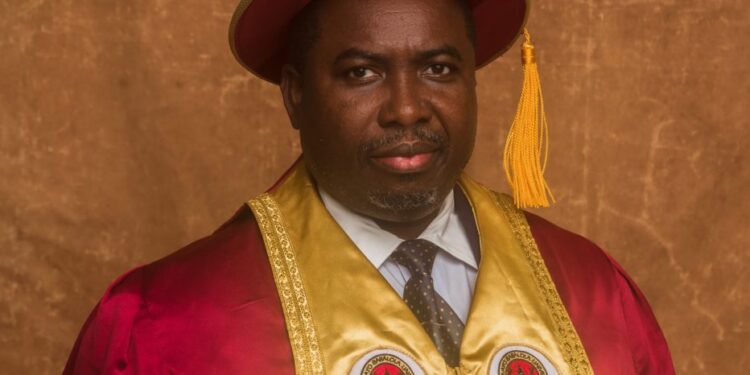Newly confirmed Chairman of the Independent National Electoral Commission, Professor Joash Ojo Amupitan, has pledged sweeping reforms to restore public trust in Nigeria’s electoral system, beginning with a robust overhaul of election technology and internal accountability mechanisms.
Amupitan, confirmed by the Senate on Thursday, outlined a vision rooted in transparency, civic engagement, and technological integrity. Central to his agenda is rebuilding confidence in election technologies such as the Biometric Voter Accreditation System (BVAS) and the INEC Result Viewing Portal (IReV), both of which came under scrutiny following the 2023 general elections.
“There has been confusion over certain innovations introduced by INEC, such as the electronic collation system,” Amupitan told lawmakers during his screening. “The Supreme Court has clarified some of these matters. When we assume office, we will assess the infrastructure on ground, review the technology and adopt the best approach that enhances transparency and credibility in elections.”
He assured senators that election technology would not be discarded but strengthened to improve transparency. He also committed to a full audit of INEC’s data and systems to fix prior failures. “Our goal is to make elections so credible that even the loser will be able to congratulate the winner in good faith,” he said.
On inclusivity, Amupitan promised to end voter disenfranchisement and deliver credible elections across all regions. “We will invest in logistics and technology. Where necessary, drones will be used to deliver materials to hard-to-reach areas. Every eligible Nigerian must be able to vote,” he declared.
Emphasising the importance of civic education, Amupitan revealed plans to launch a nationwide voter education campaign. He also announced the creation of an INEC Ethics and Compliance Committee to act as an internal watchdog. “When people understand the process, they are less likely to be manipulated. Our goal is to build an informed electorate that participates fully and freely,” he said.
“We must establish a credible internal mechanism to monitor the conduct and behaviour of officials,” Amupitan noted, referencing past cases of malpractice, including incidents in Bayelsa and Adamawa states. He added that the Commission would adopt a whistleblower policy to protect those who report misconduct.
Amupitan also called for legislative support to establish an Electoral Offences Commission with powers to investigate and prosecute electoral crimes. “The current system lacks sufficient capacity to handle electoral crimes. We plan to develop a system that can detect, investigate and prosecute misconduct, supported by forensic methods when necessary,” he said.
On election security, he pledged to work closely with the Joint Committee on Election Security to protect personnel, materials, and voters, particularly in volatile regions. “Security is central to credible elections,” he said.
Addressing financial accountability, Amupitan vowed to ensure that INEC funds are used strictly for their intended purposes. “We will strictly adhere to the Public Procurement Act and the Finance Act, and we will seek ways to cut costs where possible without compromising efficiency,” he assured.
He also identified inconsistencies in the Electoral Act and promised to work with the National Assembly to harmonise election timelines. “A clear and consistent electoral timetable will help to build public confidence and reduce post-election disputes,” he noted.
Amupitan’s confirmation makes him the sixth substantive INEC Chairman since Nigeria’s return to democracy in 1999. His nomination was confirmed by the Senate through a voice vote without opposition after being cleared of security and health concerns.
Senate President Godswill Akpabio praised Amupitan’s qualifications and urged him to focus on rebuilding electoral credibility ahead of the 2027 general elections. “We looked at your resume. The DSS and Police have both confirmed that you have no criminal record. You have no known medical issues. You are eminently qualified,” Akpabio said.
Senate Minority Leader Abba Moro also commended Amupitan’s credentials, encouraging him to translate his legal and academic experience into electoral reform. Senator Simon Lalong, former Plateau State Governor, vouched for his integrity, recalling their time at the University of Jos.
However, Amupitan’s screening was not without contention. Some lawmakers, including Senator Solomon Adeola, objected to Senate President Akpabio’s attempt to block questions on BVAS and IReV. Adeola insisted that Nigerians deserved clarity on how the technologies would be used going forward.
In his final remarks, Akpabio condemned the state of local government elections, calling them “a disgrace to democracy.” He urged Amupitan and the National Assembly to support constitutional reforms that would make local elections more credible and independent of state control.
Since 1999, INEC has been chaired by Justice Ephraim Akpata, Dr. Abel Guobadia, Prof. Maurice Iwu, Prof. Attahiru Jega, and Prof. Mahmood Yakubu, with Jega widely recognised for overseeing the historic 2015 presidential transition.

